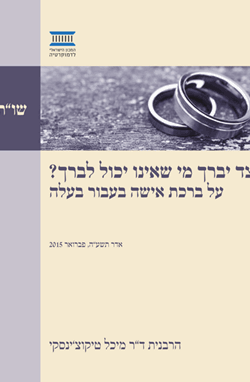Blessings and Disabilities: Can a Woman Bless on Behalf of Her Husband?
- Written By: Michal Tikochinsky
- Publication Date:
- Cover Type: Online Booklet
- Number Of Pages: 24 Pages
- Center: Human Rights and Judaism
A responsum that deals with an issue that affects many families who are caring for elderly parents: Can a woman recite blessings or perform a religious action on behalf of her impaired husband or father even if she does not share the same religious obligation? Rabbanit Dr. Michal Tikochinsky presents general principles that can be applied to other situations.
The right to respect and dignity has come to occupy an ever-larger place in public discourse and is becoming a fundamental right in Israeli law. This right is also present in halakhic discourse. Many books and articles have been written that establish “human dignity” (kavot habriot) as a concept with decisive weight for halakhic jurisprudence, especially for persons with emotional, intellectual, or physical disabilities.
The question of human dignity and protecting the image of God, however, does not only arise with regard to such exceptional groups. It also emerges as an issue when people grow older and at various stages at the end of life. In most cases, the transition from an active and healthy person to one who is losing control of his or her body and bodily functions is gradual. In parallel, the question of the borders of halakhic competence intensifies. On the other side, there is the question of the extent of willingness to invoke the value of respect for human dignity in order to permit those who are becoming incapacitated to fulfill their religious desires, even if they are trapped in a frail and tired body.
This responsum by Rabbanit Dr. Michal Tikochinsky deals with an issue that affects many families who are caring for elderly parents. Old age is frequently accompanied by growing dementia—a decline in cognitive, mental, and social functioning—and manifested in personality changes as well. Each case is different, and the deterioration is usually slow and impacts different bodily systems in different ways. In some instances, a person may slowly lose the ability to speak, mobility becomes limited, and he or she may have problems with fine and gross motor skills. A similar process, sometimes more rapid, may occur following a stroke. Some functions may be affected, including those that enable communication with one’s surroundings. The ability to retrieve words and the ability to understand them are sometimes impaired. Given the complexity of this condition and its symptoms, each case requires its own treatment, but general principles can be extracted from this responsum.
This project has been made possible by the generous support of The Ruderman Family Foundation and an anonymous foundation operating in Israel
Rabbanit Dr. Michal Tikochinsky is head of the Moshe Green Women’s Beit Midrash at Beit Morasha of Jerusalem.


